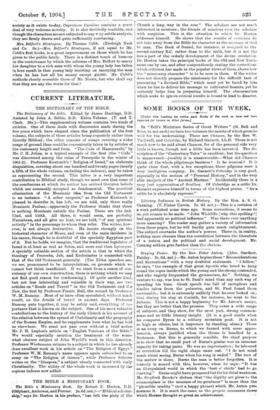CURRENT LITERAT (IRE.
The Dictionary of the Bible. Edited by James Hastings, D.D. Assisted by John A. Selbie, D.D. Extra Volume. (T. and T. Clark. 28s.)—This supplementary volume contains two kinds of articles. One of these deals with discoveries made during the five years which have elapsed since the publication of the first volume, the subjects of these articles being cognately rather than directly Biblical ; the other consists of essays covering a wider range of ground than could be conveniently taken in by articles of the customary length and form. "The Code of Hammurabi," by Mr. C. H. Johns, is a typical example of the first (the "Code" was discovered among the ruins of Persepolis in the winter of 1901-2). Professor Kautzsch's "Religion of Israel," an elaborate disquisition, covering about one hundred and twenty pages (nearly a fifth of the whole volume, excluding the indexes), may be taken as representing the second. This latter is a very important contribution to Biblical study, though we must own that some of the conclusions at which its author has arrived threaten beliefs which are commonly accepted as fundamental. The practical elimination of the Messianic idea from the Old Testament is an instance. "A sober exegesis," as Professor Kautzsch is pleased to describe it, has left, we are told, only three really Messianic Psalms,—apparently the Professor thinks that there is 'nothing Messianic outside the Psalms. These are the 2nd, 72nd, and 110th. All three, it would seem, are probably Maccabean, and all give no hint, we are told, "of any spiritual activity" in the personage to whom they refer. The writer, how- ever, is not always destructive. He insists strongly on the historical character of Moses, and even of the main incidents in his career, though he is doubtful of the specially Egyptian part of it. But he holds, we imagine, that the traditional legislator of Israel is at least as real as Solon, and more real than Lycurgus. A specially valuable section of the article is that in which the theology of Proverbs, Job, and Ecclesiastes is connected with that of the Old Testament generally. (The Elihu speeches are, we see, pronounced to be interpolations, on grounds which we cannot but think insufficient. If we start from a canon of con- sistency of our own construction, there is nothing which we may not find good reason for condemning.) Of quite another kind, but not less interesting and valuable in their way, are two articles on "Roads and Travel" in the Old Testament and the New, the first by Professor Frantz Bull, the second by Professor W. M. Ramsay. Most of us have often speculated, without much result, on the details of travel in ancient days. Professor Ramsay puts together, it may be safely said, everything of im- portance that is known on the subject. One of his most valuable contributions to the history of the early Church is his account of the relation between the spread of Christianity and the geography of the Roman Empire, and he supplements here what he has told us elsewhere. We must not pass over without a brief notice Mr. J. H. Lupton's article on "English Versions of the Bible." We would especially mention the treatment of the some- what obscure subject of John Wyclif's work in this direction. Professor Wiedemann returns to a subject in which he has already done excellent work in his article on "The Religion of Egypt." Professor W. M. Ramsay's name appears again subscribed to an essay on "The Religion of Greece"; while Professor Scharer writes on the "Diaspora," a subject closely connected with early Christianity. The utility of the whole work is increased by the copious indexes now added.










































 Previous page
Previous page